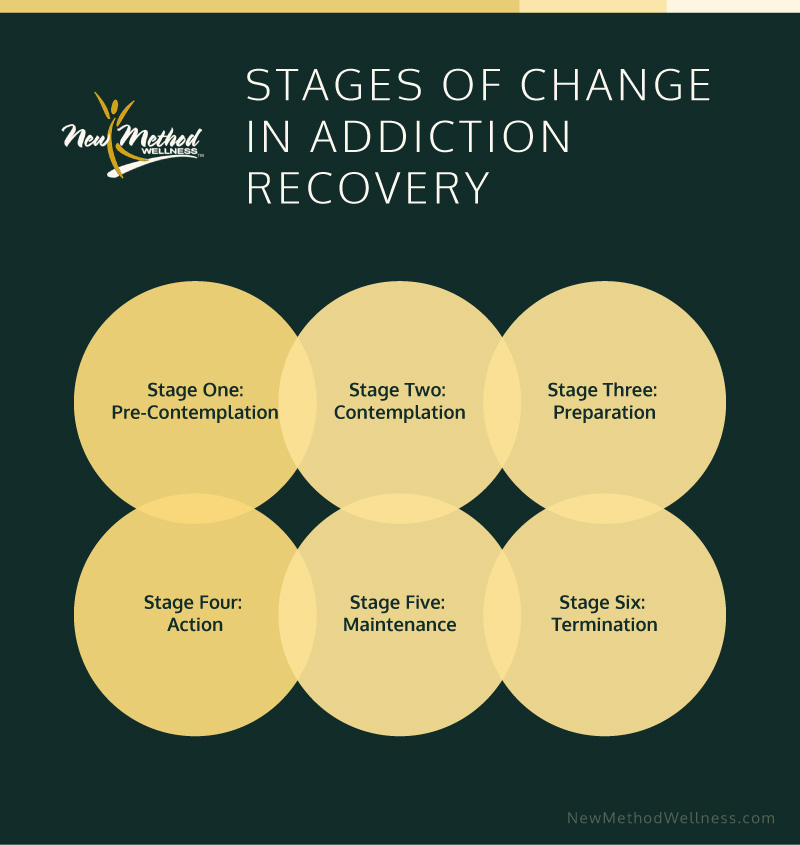The recovery process from addiction isn’t simple or easy. It’s better to think of addiction recovery as a long journey that may take you to unexpected places before you reach your destination. Sometimes, people think of recovery from addiction as a straight line where you proceed from Point A to Point B. However, they may end up disappointed when they find themselves on many detours. Thinking of recovery as a journey rather than a straight line is more helpful in understanding the stages of addiction recovery.
Stages of Change in Addiction Recovery
One way to look at the journey of addiction recovery is through stages of change. That idea was first introduced by a trio of psychologists who wrote a book called “Changing for Good” in 1994. In this book, James Prochaska, Carlo DiClemente and John Norcross examine the stages of addiction recovery in what is sometimes called the Transtheoretical Model. These stages are as follows:
• Pre-contemplation
• Contemplation
• Preparation
• Action
• Maintenance
• Termination
These stages cover the recovery journey from an active state of addiction to the final destination of lasting sobriety. They also clarify the rehab process and make it easier to comprehend. The recovery journey thus transforms from a straight line of Point A to Point B to a roadmap with several distinct checkpoints.
Stage One: Pre-Contemplation
We begin the stages in the throes of substance abuse. As your addiction gets worse, so does the severity and frequency of the consequences. At this point, you usually have an awareness of the consequences of your addiction, but you are actively justifying them or trying to convince yourself that they are no big deal. You might even be fully cognizant that you have an addiction and need treatment. However, at this stage, you still prefer your substance of choice. In other words, you likely believe the current pleasures of addiction are greater than any repercussions you may be experiencing.
Stage Two: Contemplation
Proceeding into the second addiction recovery stage, you begin to realize that the effects and consequences of substance abuse are more serious than you originally thought. You start realizing that addiction is messing up your life. However, you’re still uncertain that the negative effects are overwhelming your enjoyment of drugs or alcohol. This stage is called contemplation because the addicted person is now beginning to contemplate the idea of getting treatment. They haven’t decided to get sober yet, but they’re thinking about it.
A person in this stage is usually willing to accept that their addiction is a problem. However, when recovery is brought up to them, they may come up with various excuses for why they can’t do it right now. For example, they might say they are only drinking too much due to a stressful job, but soon they plan to quit that job. They may expect that they will also easily quit alcohol once this happens.
Stage Three: Preparation
Once you reach the preparation stage of addiction recovery, you typically begin to realize that the consequences of substance abuse are worse than any benefits. Behavioral changes begin to look appealing and also attainable. You realize that treatment is the only way to change your life and get away from addiction. A person in this stage often starts accepting advice and support from their family and friends. They may start feeling proactive and productive as they research different methods of recovery and gather information about the process. Once you reach this stage, you may be willing to make a commitment to seeking treatment and recovering from addiction.
Stage Four: Action
Finally, you’re ready to take action to facilitate recovery. You will probably take the first real step by enrolling in a recovery program at an addiction treatment center. You realize that recovery is more than simply getting sober. Instead, you want to make the big behavioral and lifestyle changes that will lead to lasting sobriety and a healthier life going forward. Along with learning recovery skills and strategies, you dive into formulating nutrition goals, fitness goals and plans for a new career. This is also when you begin repairing your relationships likely damaged by addiction. This is probably one of the most important stages in recovery.
Stage Five: Maintenance
Before this stage and after the last stage, you have completed treatment or rehab and now shoulder the responsibility for staying sober during recovery. In other words, the action stage generally results in sobriety after a period of detox and treatment. Now, you must move forward and maintain that sobriety. The goal of recovery is ultimately lasting sobriety, which is different from becoming sober after treatment. Relapses can always occur on the recovery journey, and they often do. You shouldn’t be discouraged if you relapse a few times during recovery. Just keep in mind that your goal is lasting sobriety where relapse is a faint shadow in the past. It’s not something you actively worry about.
Stage Six: Termination
Once you reach this stage, the recovery process is typically complete. Even though it’s a lifelong process to continue staying sober, once you’re in this stage you have probably regained your health, your relationships and your career. You’re likely to be financially independent and confident of your ability to remain this way. If someone asks you if you miss the lifestyle of addiction, you’re likely to reply that you have no desire for any part of that. You will generally feel relief that your habits have changed for the better.
The Benefit of Recovery Stages
The best thing about the six stages of recovery is that they clearly and concisely reveal a process that may otherwise look too complicated from the outside. Why is this important? Because it shows the diversity of paths that people use to get away from addiction. It might involve rehab, a 12-Step program or something else. The process of recovery also looks less daunting and more about individual experiences than a strict timeline.
New Method Wellness For Addiction Recovery
As a dual diagnosis treatment center, New Method Wellness understands that recovery is a highly personal and individualized process for every person. As such, we offer a wide range of treatments and personalized plans to help you begin the process of recovery. We offer outpatient treatment and intensive outpatient treatment as well as residential and private treatment. Some of our programs include the following:
• Family Group Therapy
• Cognitive Behavioral Therapy
• Art Therapy
• Yoga Therapy
• Nutritional Counseling
During treatment, you will learn the skills you need to live a healthy life going forward.
If you or someone you love is struggling with addiction, get in touch with New Method Wellness to find out more about our treatment programs. Begin the journey to recovery today.
For more information about our Addiction Treatment Programs call 866.951.1824 today!








